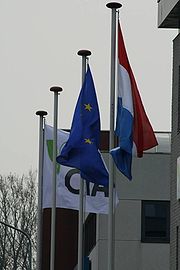
Technical Centre for Agricultural and Rural Cooperation ACP-EU (CTA)
Encyclopedia

Lomé Convention
The Lomé Convention is a trade and aid agreement between the European Community and 71 African, Caribbean, and Pacific countries, first signed in February 1975 in Lomé, Togo.- History :...
between the ACP countries
ACP countries
The African, Caribbean and Pacific Group of States is a group of countries , created by the Georgetown Agreement in 1975. The group's main objectives are sustainable development and poverty reduction within its member states, as well as their greater integration into the world's economy...
and EU member states. Since 2000 CTA has operated within the framework of the ACP-EU Cotonou Agreement
Cotonou Agreement
The Cotonou Agreement is a treaty between the European Union and the African, Caribbean and Pacific Group of States . It was signed in June 2000 in Cotonou, the largest city in Benin, by 78 ACP countries and the then fifteen Member States of the European Union...
with a mission to “strengthen policy and institutional capacity development and information and communication management capacities of ACP agricultural and rural development organisations. It assists such organisations in formulating and implementing policies and programmes to reduce poverty, promote sustainable food security
Food security
Food security refers to the availability of food and one's access to it. A household is considered food-secure when its occupants do not live in hunger or fear of starvation. According to the World Resources Institute, global per capita food production has been increasing substantially for the past...
, preserve the natural resource base and thus contribute to building self-reliance in ACP rural and agricultural development.”
CTA work focuses on three key areas:
- providing information products and services (e.g., publications, question-and-answer services and database services)
- promoting the integrated use of communication channels, old and new, to improve the flow of information (e.g., e-communities, web portals, seminars, and study visits)
- building ACP capacity in information and communication management (ICM), ICT for Development (ICT4D) and web 2.0 for Development web2fordev mainly through training and partnerships with ACP bodies and other international organisations.
CTA Products, Projects and Services
CTA regularly issues a range of online services and print publications, including:- Spore— Information for ACP agricultural development
- ICT UpdateICT updateICT Update is a bimonthly printed bulletin, a web magazine, and an accompanying email newsletter that explores innovative uses of information technology in agriculture and rural development in African, Caribbean and Pacific countries....
— A current awareness bulletin for ACP agriculture - Agritrade — Agricultural trade issues in ACP-EU relations
- Knowledge for Development — ACP/EU S&T Policy Dialogue
- Newsfordev - The Latest News for Development Professionals
- Anancy"" - Virtual resource centre of CTA publications
- Brussels Weblog - Online daily news service on ACP-EU Development Cooperation
- Brussels Development Briefings - Bimonthly Briefings on key issues in ACP-EU Rural Development Cooperation
- Web2forDev Gateway - Updates on Web 2.0 applications used in the context of development cooperation
Countries
The Centre, which is based in WageningenWageningen
' is a municipality and a historical town in the central Netherlands, in the province of Gelderland. It is famous for Wageningen University, which specializes in life sciences. The city has 37,414 inhabitants , of which many thousands are students...
, the Netherlands
Netherlands
The Netherlands is a constituent country of the Kingdom of the Netherlands, located mainly in North-West Europe and with several islands in the Caribbean. Mainland Netherlands borders the North Sea to the north and west, Belgium to the south, and Germany to the east, and shares maritime borders...
, is active in seventy nine ACP countries
ACP countries
The African, Caribbean and Pacific Group of States is a group of countries , created by the Georgetown Agreement in 1975. The group's main objectives are sustainable development and poverty reduction within its member states, as well as their greater integration into the world's economy...
. CTA has an office in Brussels.
Funding
CTA’s resources are derived mainly from the European Development FundEuropean Development Fund
The European Development Fund is the main instrument for European Union aid for development cooperation in Africa, the Caribbean, and Pacific countries and the Overseas Countries and Territories...
, but also from other European programmes or countries that may assign it appropriations or offer co-funding for operations.
External links
See also
- ACP CountriesACP countriesThe African, Caribbean and Pacific Group of States is a group of countries , created by the Georgetown Agreement in 1975. The group's main objectives are sustainable development and poverty reduction within its member states, as well as their greater integration into the world's economy...
- ICT4D
- Food safetyFood safetyFood safety is a scientific discipline describing handling, preparation, and storage of food in ways that prevent foodborne illness. This includes a number of routines that should be followed to avoid potentially severe health hazards....
- Food securityFood securityFood security refers to the availability of food and one's access to it. A household is considered food-secure when its occupants do not live in hunger or fear of starvation. According to the World Resources Institute, global per capita food production has been increasing substantially for the past...
- web 2.0
- web2fordev Web 2.0 for Development

